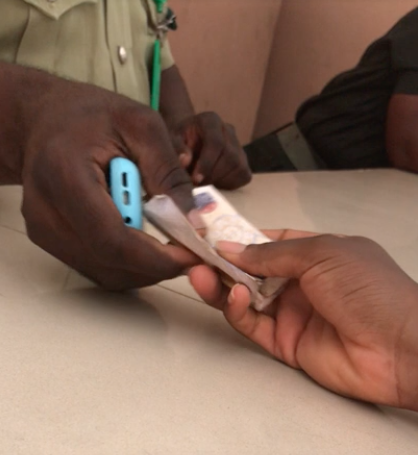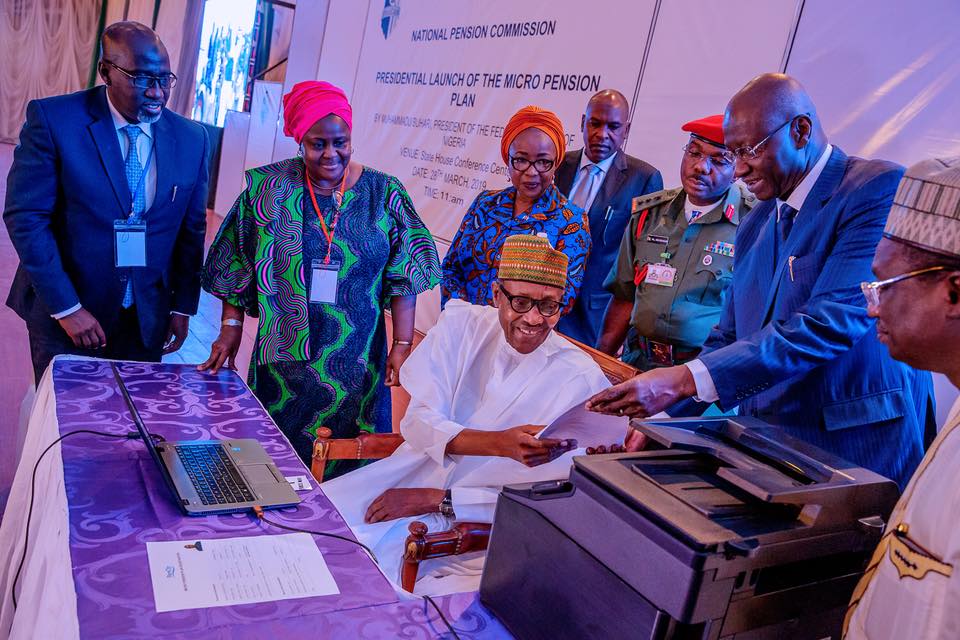In December 2020, the Nigerian Communications Commission (NCC) issued a 14-day ultimatum to network operators to block SIM cards not registered with the national identity number (NIN). The NIN is a form of identification introduced by the federal government and managed by the National Identity Management Commission (NIMC). On December 16, the deadline was shifted by 10 weeks in order to give Nigerians more time to submit the NIN to their network providers. In a bid to beat the deadline, crowds thronged NIMC centres across the country, openly flouting the COVID-19 protocol on social distancing, while some government officials saw an avenue to make quick money, albeit illegal. TheCable reporters went undercover to NIMC centres in six states — Akwa Ibom, Benue, Edo, Oyo, Lagos and Nasarawa — and found that the enrolment, which is supposed to be free at first registration, has now become an avenue for extortion.
AT IKOT EKPENE, NO N1,500, NO NIN
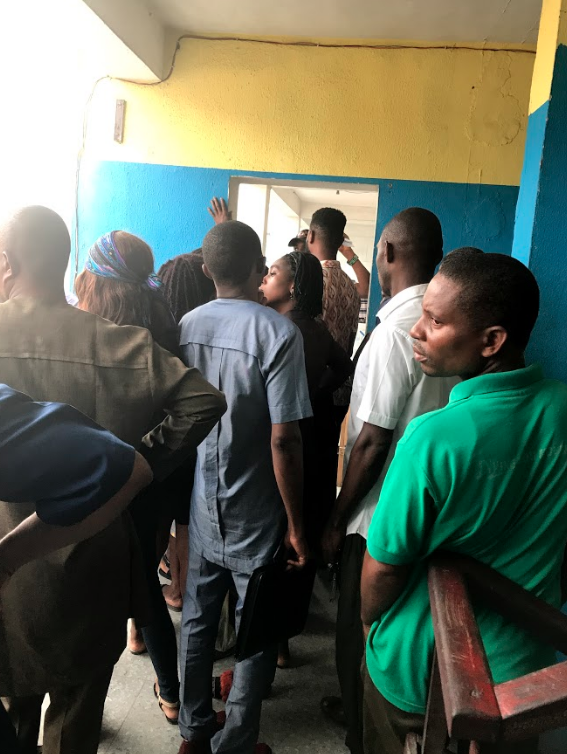
It was not yet 6am when the reporter arrived at the NIMC office in Ikot Ekpene, Akwa Ibom state — yet was greeted by the sight of a crowd under a canopy, waiting for the registration exercise to start.
“You will need to pay N1,500 for a form,” one of those waiting told the reporter. “After you finish the registration, they will give you a slip for temporary keep. Later, when the NIN is out, you will still pay another N500, making N2,000,” a female bystander added.
Advertisement
Asked if she was aware that the enrolment is free, she nodded, but said it was expected that the officials would request for money since “this is Nigeria”.
When approached, an official of NIMC who identified himself as Alains Andem told the reporter to return after one week as the forms had finished. “You don’t need anything apart from N1,500 for the form, that’s all,” he said.
After speaking with more than 10 people at the registration centre, it was gathered that most of them had paid the N1,500 and were awaiting biometric identification.
Advertisement
N800 FOR STUDENTS, N2,000 FOR OTHERS AT AKWA IBOM VARSITY
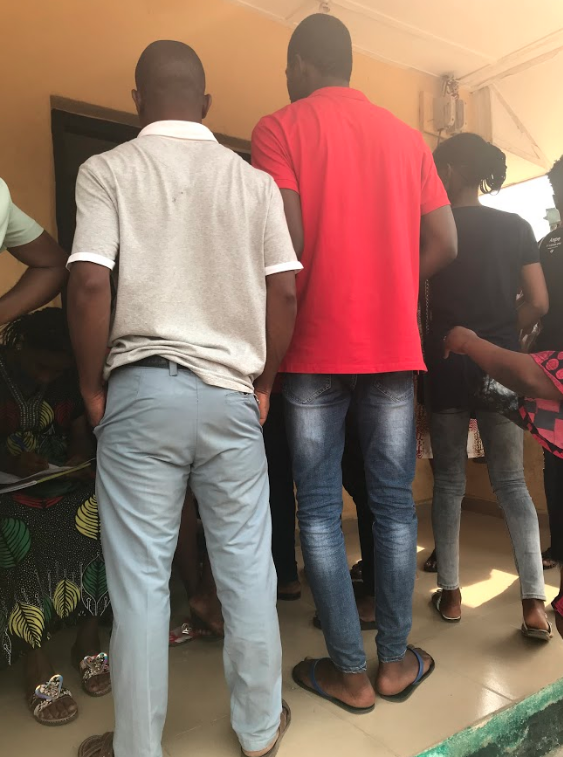
At the NIN enrollment centre inside Akwa Ibom State University, Abak, two lists of names were presented; one for students and the other for non-students. For students, the charge was N800, while non-students were asked to pay N2,000.
A security operative manning the entrance asked the reporter to join the group of non-students, and wait to be called. Soon, another official came to the entrance and called out a few names after which the door was shut. After about 30 minutes, the reporter was called in along with three others who gave money to an official before being directed to sit at a corner of the room.
When it got to the reporter’s turn, the NIMC official asked for a payment of N2,000. Acting ignorant, the reporter — who had previously obtained the NIN — insisted that registration is free, but the official maintained that it was payment “before anything else”.
Advertisement
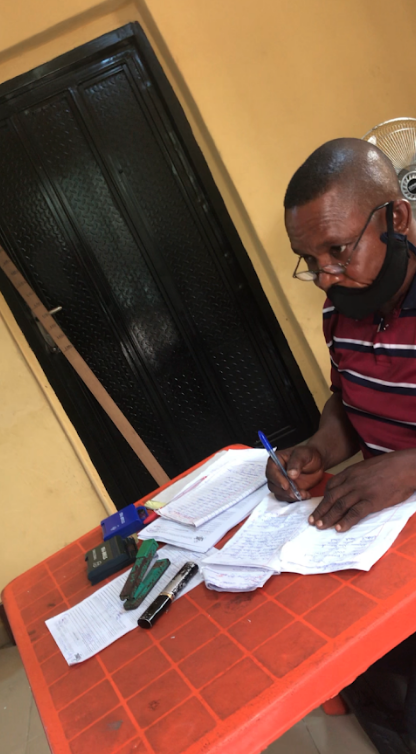
A student, who identified himself as Utibe, said the officials were prioritising the non-students, owing to the higher sum they were asked to pay.
“They were not really paying attention to the students; they were paying more attention to the villagers. They charge villagers N2,000, then students N800 because they’re using the school compound to do it. I couldn’t do it. I had to look for alternatives to register. The stress there is very hectic,” he said.
N5,000 FOR SAME-DAY REGISTRATION IN UYO
Although some centres openly demanded payment, others were discreet about it. At the federal government secretariat, Uyo, the first contact was a security officer with the name tag ‘K.E. Ewezu’. When asked where the NIN registration was being done, he responded with another question: “Do you have anyone there?”
Advertisement
After responding in the negative, Ewezu went ahead to explain that the registration area was crowded. He, however, said he had a contact among the officials who could help speed up the enrolment process without filling the form — but for a fee. He bragged that it had been done for others and even pointed to a woman he had just “helped”.
“It will cost you up to N3,000; there are some people that will tell you even N5,000. Let me call someone there,” he said and proceeded to make a phone call but he got no response.
Advertisement
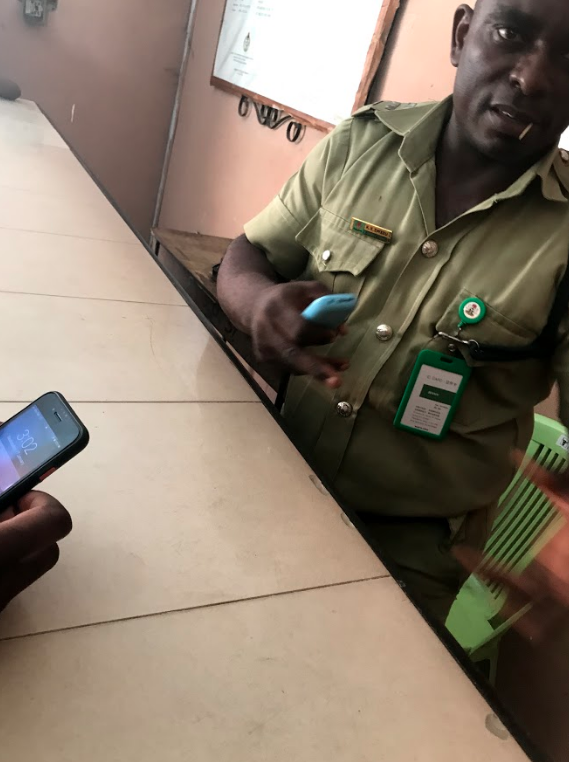
After waiting for a few minutes, the contact, identified as Ella, returned his call and the security officer told her he would send the name via SMS.
As soon as the payment of N3,000 was made, Ewezu directed the reporter upstairs. True to his words, the venue was packed with worn-out hopefuls struggling to get as close as possible to the door. After speaking with one of the applicants, it was gathered that most persons had arrived as early as 5am to fill the forms. The names on the forms would then be called one after the other for each person to come into the room for biometric identification.
Advertisement
After about 30 minutes of waiting with the crowd, the reporter and a few others were called in by a policeman who had ‘Agudah’ written on his name tag. A few persons, who noticed the reporter’s time of arrival, grumbled their disapproval — but that was where their protest ended.
Inside the room, there were three officials. Enrollees, who had been called in, queued beside the officials they were directed to. The reporter was directed to Ella, who showed her which queue to join.
Advertisement
This tactic of extortion was also the same used at the NIMC centre at Plaza 5, Willington Bassey Way, Uyo. There, the charge was between N1,000 and N2,000.
LAGOS: ‘PAY N8,000 OR COME BACK IN MAY’
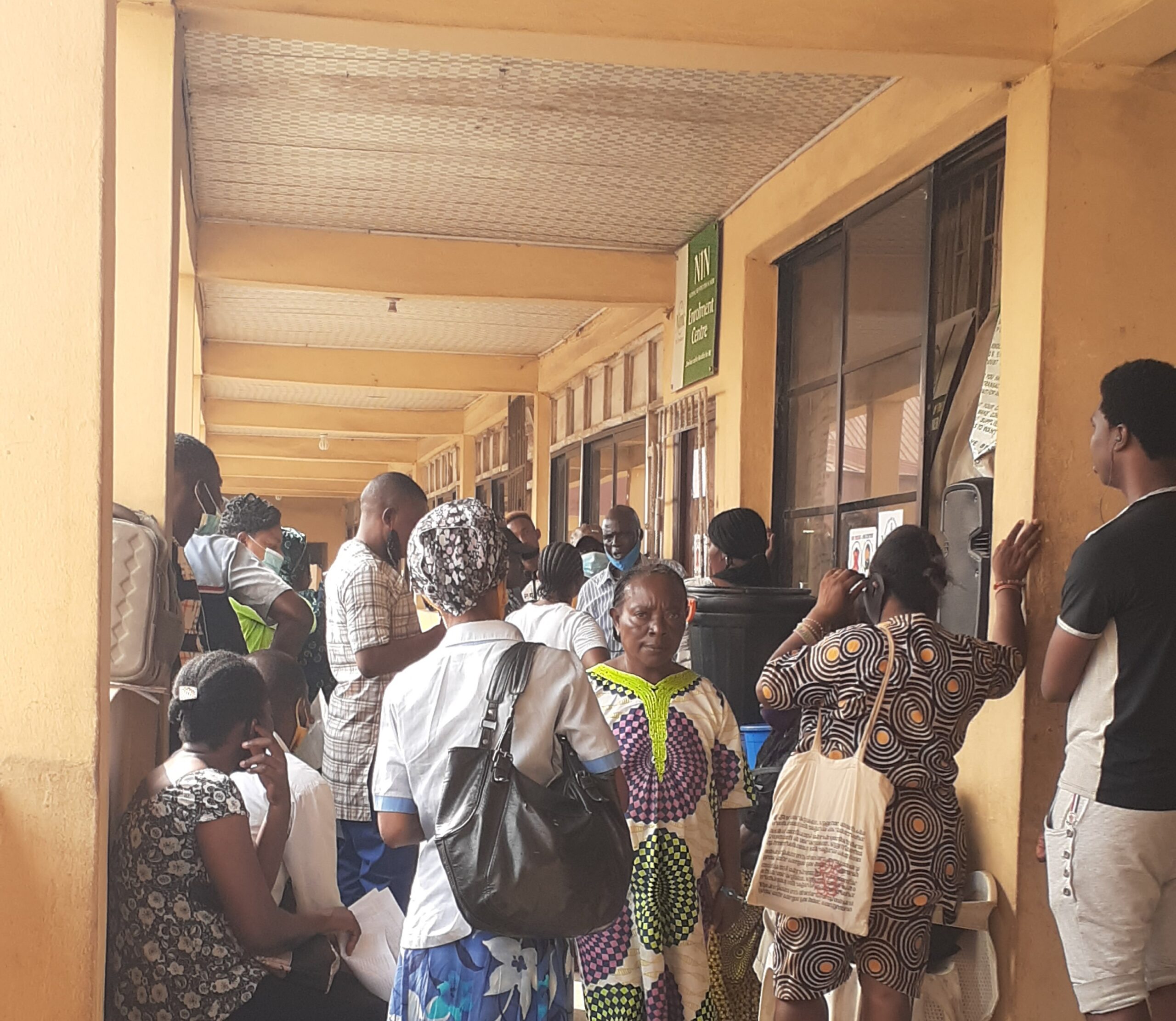
When TheCable visited the enrolment centre at Igando-Ikotun LCDA in Lagos, the same ‘cash for VIP treatment’ was on display.
While some applicants who had already booked for biometric capture were asked to queue outside the office, a few others were seen going inside. Not pleased with the development, an applicant burst out in anger.
“How can we be on the queue here and they are bringing people from outside and going in? It is wrong. This place was organised before. Now, they have turned it to something else,” he lamented.
Subsequently, the reporter, under the guise of an applicant who urgently needed the NIN to obtain an international passport, approached an official who identified himself as Seun Olowolagba. He was coordinating the queue and responding to enquiries and complaints. After the reporter explained the urgency of the enrolment, Olowolagba agreed to help.
“Once you have money, you will do it. For N8,000, you will do it tomorrow morning. For N5,000, you will do it on Saturday. Pick one of the two,” he said.
Despite pleas for a reduction in price, he remained adamant, stating that there were many others willing to pay for the service.
“This is not a market where you can price a product. I am not the government that gave you the policy. You can choose to come back by May. That one is for free,” Olowolagba said, with a dismissive wave of his hand.
After agreeing to wait for the N5,000 enrollment which would take place at the NIMC centre at Igando-Ikotun LCDA, Olowolagba went into an office where he added the reporter’s name to a list tagged ‘NIN Saturday Appoint’.
Requesting for a phone number, he promised to contact the reporter before the specified date, adding that the money would be received in cash before registration. True to his words, the reporter got an SMS on Saturday night, stating that the registration exercise would hold on Sunday, January 31.
SIMILAR EXPERIENCE AT OJO LGA
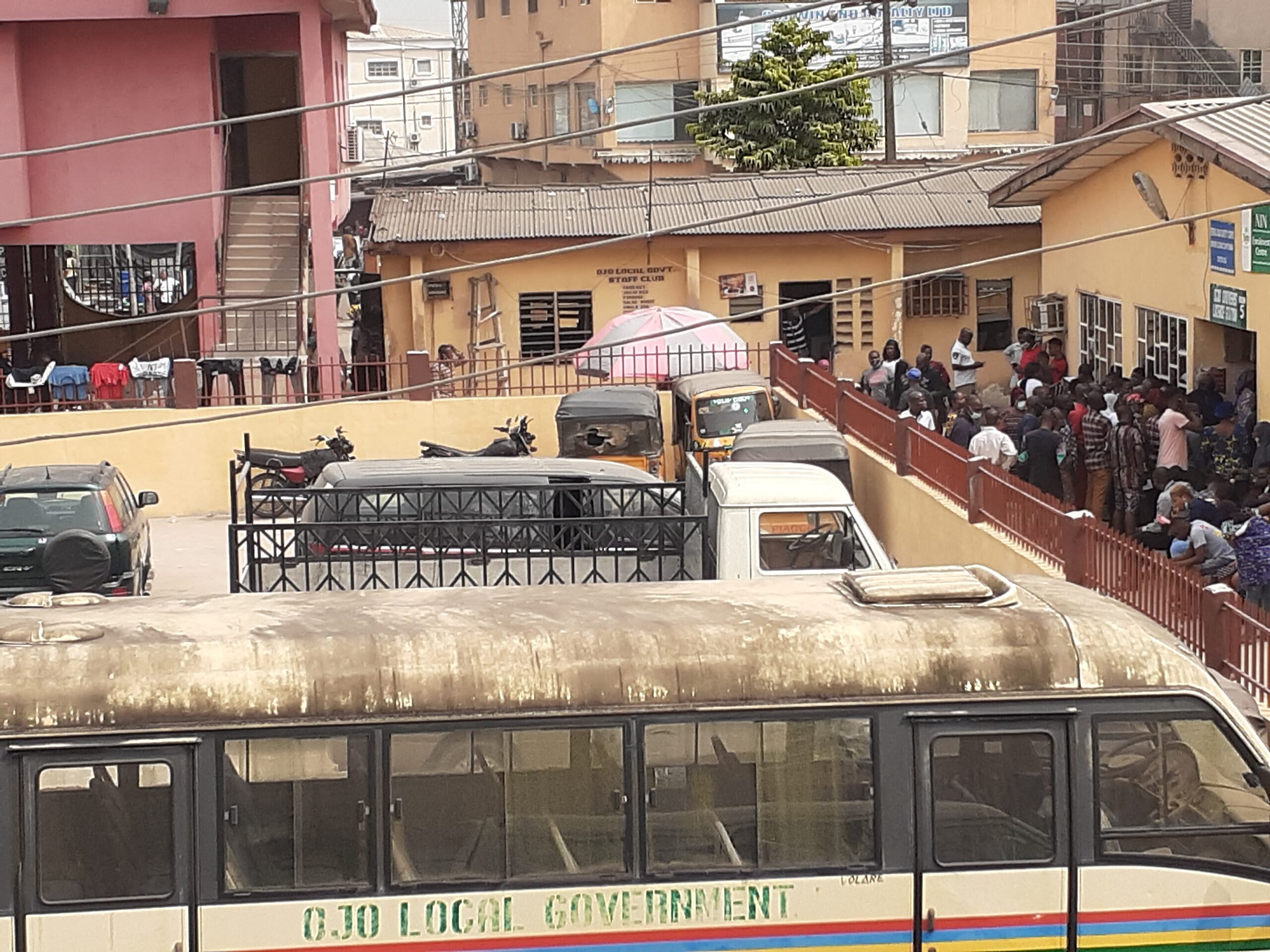
Unlike Igando-Ikotun, people were barred from the premises by security officers guarding the entrance at Ojo. TheCable witnessed a scuffle between the security officers and disgruntled residents who demanded to be allowed in.
Grace Chukwuma, an applicant, told TheCable that she had arrived as early as 5am with her aged mother, yet they had not submitted their forms by 9am.
The reporter was approached by an agent who offered to help fast-track the enrolment exercise. The man identified himself as Haruna and said he’s a clerical officer at the Ojo LGA. “You can do it here but you won’t get it two months from now. I can’t lie to you; the stress is too much. Even if you come here as early as 5am, you will meet a crowd here,” he said.
He told the reporter that the enrolment could be done instantly at the FESTAC passport office for a fee of N10,000, or he could try to talk to staff members of the Ojo LGA who work with NIMC officials to get it done for less.
After exchanging contact details with various individuals to “help” them with their registration, Haruna took the reporter to the Ojo LGA cafeteria to meet one “Igwe” whom he said would get the job done.
Igwe, a middle-aged man whose real name was Wasiu, said the registration costs N5,000 and it would take a week or more to obtain the NIN slip. He, however, explained that he had booked enough people for registration and there were no more available slots till the following week.
“If you have N50,000 with you now and take it to them inside the office, they won’t do it for you. Their hands are full. If I collect your money now, I will take it and book you for next week,” he said. “By the time you come that particular day, your name would be part of those on the list for enrolment. It is not about coming early. You are on your own if you think that. This is Lagos. It’s the people they have collected money from and booked that they are calling out on the list.”
Watch the exposé below:
IN BENIN, OFFICIALS APPEAR RESPONSIBLE
At the registration centre in Oredo LGA, Benin, the Edo state capital, TheCable discovered that people offered money to be registered immediately.
However, officials didn’t agree to take money for registration when offered in the offices. In fact, when TheCable visited in the last week of January, the reporter was given a date in March. The official on duty said all the dates in January and February had been booked for those who came earlier.
A woman who wanted to get registered immediately, because she had to travel, was told to wait until March 10 to be registered, even though she was ready to pay any amount.
However, outside the office, between N4,000 and N10,000 was said to be charged for immediate registration — but TheCable could not confirm this. A woman, who claimed to have paid N4,000 to an official, said she arrived at the centre with her husband around 11am, but because she was in a hurry, her husband spoke with an official of NIMC to facilitate quick registration.
“She did not even ask me to bring a printout of my bank verification number, which is one of the documents required for registration,” she alleged, adding that “I could not get her name, but I think she was in charge of NIN slips”.
According to the woman, the official asked her to write her name and BVN on a sheet of paper, and wait until she was called.
Meanwhile, some of those on the queue told the reporter that you can register at a price, but you have to win the trust of the officials and speak to them discreetly.
FRUSTRATING PROCESS IN BENUE
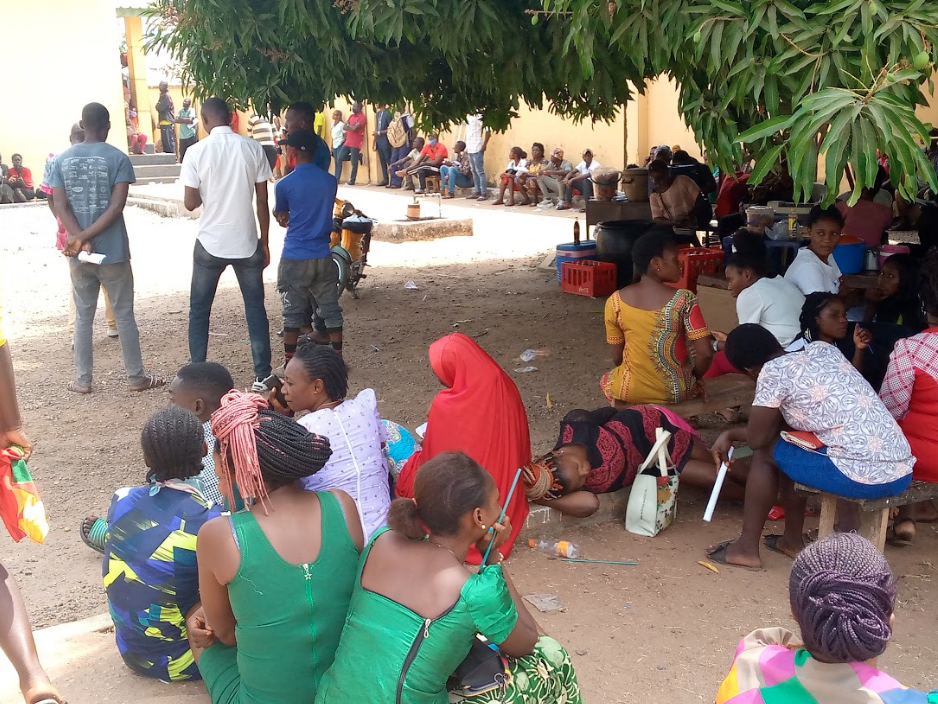
Blessing Okpabe, like other applicants at the NIMC state office in Makurdi, Benue state, believed she had done all she could to enroll on the system, but it was not as smooth-sailing as expected.
Despite the ‘not for sale’ caveat on the application form, TheCable found that it was sold for N500, with a date and signature stamped on it to prevent any attempt to make a photocopy.
“We are not supposed to pay for the form. It’s supposed to be free. It is even written on the form that it is not for sale. But when I came here, I was surprised that they are buying it and the stress at which they are doing it is too much. The transport from my house to this place is much. It is not encouraging,” Okpabe said.
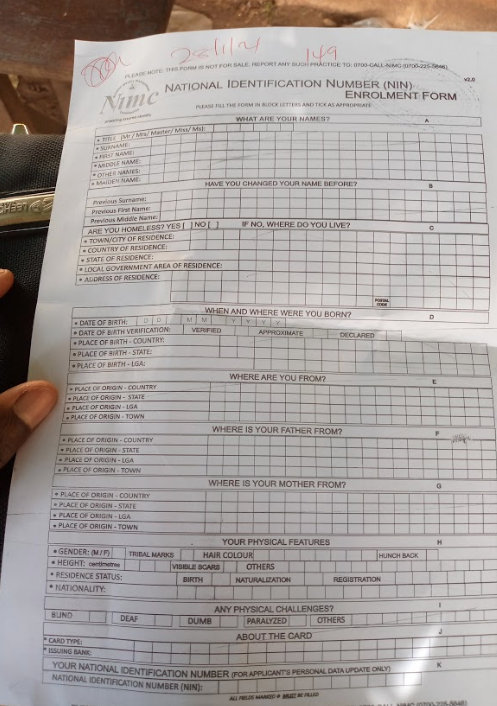
“I think if I don’t do it today, I won’t do it again. I will use someone’s NIN to link it. If the entire process was more organised by giving you a number, then you are asked to come back, it would have been easy.”
Another applicant, a middle-aged woman, shared her frustration with the reporter, saying there is no proper organisation at the centre.
She said: “I have been coming here since two weeks ago. If I come, they will say the network is bad. They will come out with small form and say they want to take it to Abuja because the network is bad.”
The woman said she bought the form, went through every other process and registered, “but just to collect my printout is the problem. I pay N500 for transport every day to come here. I have been talking to them — they refused to listen. But they are sharing new ones to people.”
IN NASARAWA, ‘VILLAGERS’ EXTORT APPLICANTS
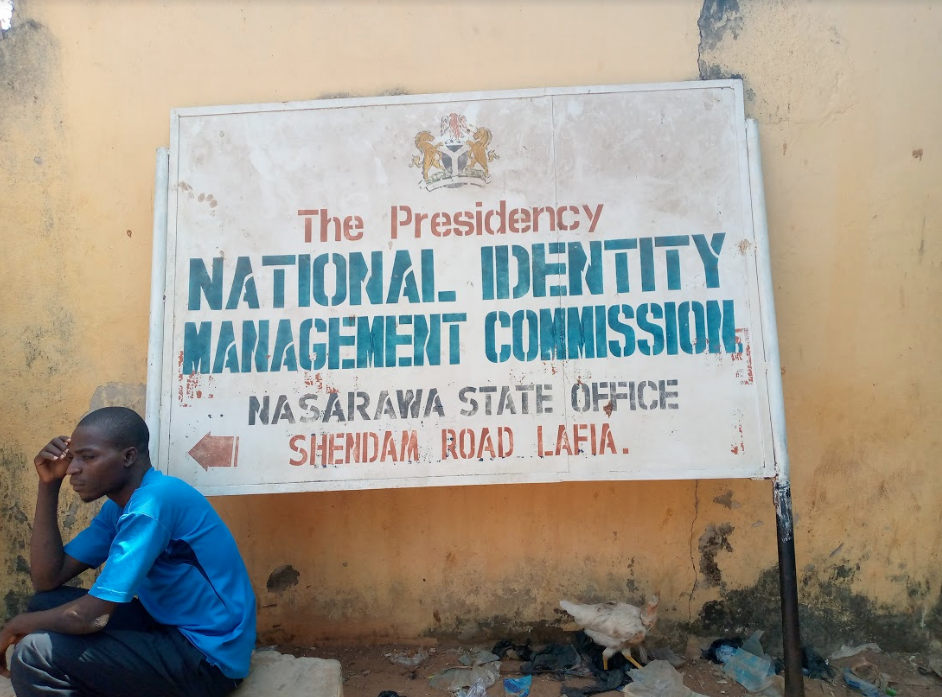
On the morning TheCable visited Shabu centre in Lafia, Nasarawa state, three young men were stationed at the gate with forms for sale. Among them was Alhassan, who identified himself as the social director in the community. He sold the form for N2,000 to applicants who couldn’t make it early enough to the centre, boasting that the reporter would not get a form from the NIMC official.
The fear and accompanying risk of leaving home as early as 5am amid security concerns brought Alhassan patronage. Indeed, when the reporter approached an official of NIMC for a form, he said they had exceeded the 80 copies for the day.
“If you don’t come early enough, you may not get the form,” Joy Iliya, a student at the College of Agriculture, Lafia, said.
“They used to give 100 copies of the form a day but they don’t give anymore. They now give 80, then the 20 they retain it for special candidates.
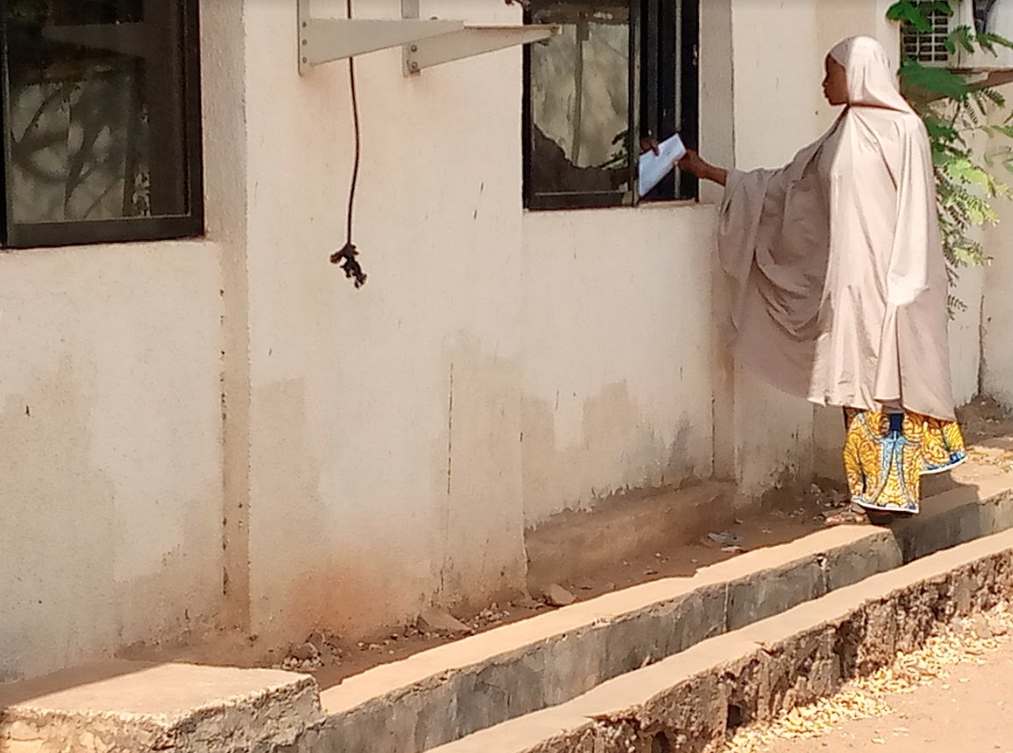
“The form is N2000 each for everybody. That is if you want to follow through the normal process. But if you want to bribe them, you pay your way. Some people that just came are attended to immediately and they leave.
“When I came at 5am, people were sleeping here. I saw people outside here; there was no light. When I was coming yesterday, I was very scared. It’s very risky to leave home at that time.”
‘DONATE N100 FOR FUEL, GET YOUR NIN’
Around 10am when the reporter arrived at the NIMC office in Ibadan, the Oyo state capital, people were seen arguing. Upon enquiry from a bystander, it was learnt that the officials had refused to begin work until the applicants contribute N100 each to fuel the electricity generator. They had been assured that if they did this, they would all be attended to that very day.
“If people pay on Monday, on Tuesday, every day they would make N16,000 minimum. We need to stop that culture, that evil culture,” one of the applicants said.
“Fifteen people contributed yesterday, but they still didn’t attend to everyone. I was here yesterday. The gate was locked until 1pm. The federal government cannot give you something to go and do and they would not back it up. This is Nigeria. Everything now is money,” another resident lamented.
There were repeated efforts by TheCable to reach Kayode Adeg0ke, NIMC spokesperson, to comment on the findings via calls and messages — but they proved unsuccessful.
A high-ranking official of the NIMC who spoke with TheCable disclosed that the organisation has learnt of the extortion being perpetrated by some of its agents and that an investigation into such acts is already underway.
As Nigeria battles the realities of the coronavirus pandemic with over 158,906 cases and 1,982 deaths as of March 8, citizens still flock to the NIMC centres, hoping to avoid the suspension of their mobile numbers.
But shady officials and their cronies have continued to exploit the situation, demanding bribes with reckless abandon, and causing further pain to Nigerians.
Reporters: Jesupemi Are, Samuel Akpan, Adetola Adegoke, Wasilat Azeez, and Abiola Ogunleye.
This is a special investigative project by Cable Newspaper Journalism Foundation (CNJF) in partnership with TheCable, supported by the OSIWA. Published materials are not views of the OSIWA.
Add a comment
